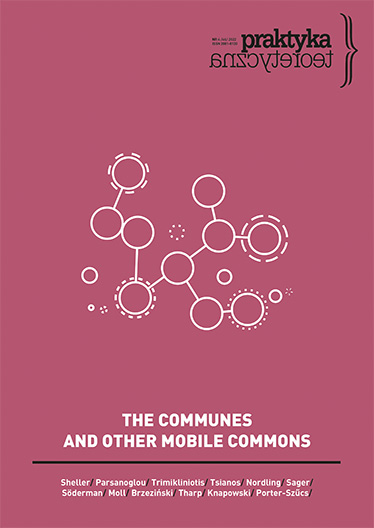Mobile Commons in the Pre-Pandemic, Pandemic and Post-Pandemic Era: Drawing from Mobility Experiences in Post-Migrant Times
Mobile Commons in the Pre-Pandemic, Pandemic and Post-Pandemic Era: Drawing from Mobility Experiences in Post-Migrant Times
Author(s): NICOS TRIMIKLINIOTIS, Dimitris Parsanoglou, VASSILIS TSIANOSSubject(s): Politics / Political Sciences, Social Sciences, Sociology, Politics and society, Social development, Economic development
Published by: Uniwersytet im. Adama Mickiewicza w Poznaniu
Keywords: mobile commons; mobility; digitality; digital border; dissensus; polari-sation; ensemble or matrix of care; pandemic and post-pandemic era; society on the move; socialities; solidarity
Summary/Abstract: This paper examines the effect of the pandemic in the gene-ration of simultaneous global, regional, and local processes as they materialize in realities and the potential for post-pande-mic mobile commons. The paper theorizes the matter drawing on studies in the triangle of Cyprus-Greece-Turkey i.e., the south-eastern border of Europe/EU. Mobile com-mons is theorized in the current context by locating these processes in the pandemic and post-pandemic era, even though the first empirical work was done during the pre--pandemic period. The pandemic brought about an abrupt interruption of what is at the core of global capitalism: mobility. During this period, regimes of exception, deroga-tion and suspension of rights were introduced across all fields of the civic, social, and political life almost all over the world. The concept of mobile commons aims to capture dynamic processes, as an ensemble or matrix of care of the society on the move, generating reciprocity on the move and a sustainability of the geography of the crossings. Digitality is part and parcel of the current migratory processes. Digitality is a space where media technologies of control coexist with the possibi-lities of alternative media use. To every form of control technology there is a corresponding form of resistance to it. The paper examines how mobile commons resist digital registration and the process that generate a pan-European digital border infrastructure which aims to immobilize people. It illustrates how encounters between groups produce social dialectics within institutions; struggles, conflicts, disagreements, and negotiations occur, but so do new socialities and solidarities in a world in a constant state of being remade.
Journal: Praktyka teoretyczna
- Issue Year: 2023
- Issue No: 46
- Page Range: 53-96
- Page Count: 44
- Language: English

